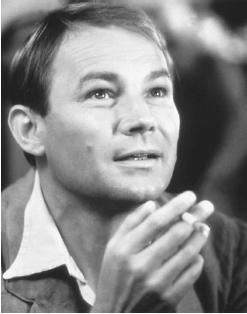Klaus Maria Brandauer - Actors and Actresses
Nationality: Austrian. Born: Altaussee, Austria, 22 June 1944. Education: Studied at the Stuttgart Academy of Music and Dramatic Art, graduated 1963. Family: Married Karen Mueller, son: Christian. Career: From 1970—actor and director with the Burgtheater (the National Theater of Austria), Vienna; 1972—film debut in The Salzburg Connection ; unhappy with film, returned to stage work;

Films as Actor:
- 1972
-
The Salzburg Connection (Katzin) (as Johann Kronsteiner)
- 1974
-
Der Widerspenstigen Zaehmung (Schenk—for TV) (as Petruccio)
- 1975
-
Das Konzert (Haugk—for TV)
- 1976
-
Die Babenberger in Oesterreich (Umgelter—for TV); Darf ich mitspielen? (Davy—for TV)
- 1981
-
Mephisto (Szabó) (as Hendrik Höfgen)
- 1983
-
Never Say Never Again (Kershner) (as Maximilian Largo); Der Weg ins Freie (Karen Brandauer—for TV)
- 1984
-
Kindergarten (Yevtushenko); Der Snob (Staudte—for TV)
- 1985
-
Redl Ezredes ( Oberst Redl ; Colonel Redl ) (Szabó) (as Alfred Redl); Out of Africa (Pollack) (as Baron Bror Blixen-Finecke); Quo Vadis (Rossi—for TV) (as Nero)
- 1986
-
Streets of Gold (Roth) (as Alek Neuman); The Lightship (Skolimowski) (as Capt. Miller)
- 1988
-
Burning Secret (Birkin) (as Baron)
- 1989
-
Hanussen (Szabó) (title role); Das Spinnennetz ( Spider's Web ) (as Lenz); La Revolution Française ( The French Revolution ) (Enrico and Heffron) (as Georges Jacques Danton)
- 1990
-
The Russia House (Schepisi) (as Savelev, "Dante")
- 1991
-
White Fang (Kleiser) (as Alex)
- 1992
-
Becoming Colette ( Colette ) (Danny Huston) (as Henri Gauthier-Villars)
- 1994
-
Felidae (Schaack—animation) (as voices of Pascal and Claudandus)
- 1998
-
Jeremiah (Winer —for TV) (as King Nebuchadnezzar)
- 1999
-
Rembrandt (Matton) (as Rembrandt); Introducing Dorothy Dandridge (Coolidge) (as Otto Preminger)
Films as Director:
- 1988
-
Speer
- 1989
-
The Artisan
- 1990
-
Georg Elser—Einer aus Deutschland ( Georg Elser ; Seven Minutes ) (+ title role)
- 1994
-
Mario und der Zauberer ( Mario and the Magician ) (as Cipolla) (+ ro as Cipolla, sc)
- 1995
-
Die Wand
Publications
By BRANDAUER: articles—
"Out of Austria," interview with Karen Jaehne, in Stills (London), March 1986.
Interview in Interview (New York), June 1986.
Interview in Hollywood Reporter , 30 December 1986.
Interview with Lynne Tillman, in Interview (New York), February 1991.
On BRANDAUER: book—
Lanz, Peter, Klaus Maria Brandauer: Ein Portrait des berühmten Schauspielerin , Munich, 1986.
On BRANDAUER: articles—
Cinema (Germany), July 1987.
Current Biography 1990 , New York, 1990.
Kurdriavtsev, S., in Iskusstvo Kino (Moscow), no. 11, 1990.
* * *
Klaus Maria Brandauer is an actor who actually has two very different and distinct careers. One is as a star in his native Europe. The other came out of his emergence during the mid-1980s as a supporting player in American films. Brandauer generally has received his greatest acclaim as an actor in Europe. The three films that are central to this aspect of his career are Mephisto , which won a Best Foreign Film Academy Award in 1981; Colonel Redl , released in 1985; and Hanussen , which came out in 1989. All are directed by Istvan Szabó, and are set in Europe before or during World War I or leading to the rise of Hitler. In each, Brandauer creates a character who, though not necessarily sympathetic to the existing power structure or "new order," compromises himself as he resigns himself to the reality of the time. Thus, a crisis of conscience is created, with each characterization becoming a skillful study in turmoil hidden beneath bravado and supreme egotism. The Brandauer characters in these films are an egocentric actor who sells out to the Nazis upon Hitler's coming to power (in Mephisto ); a determined career soldier of modest background who achieves a lofty position in the Austro-Hungarian military prior to World War I (in Colonel Redl ); and an Austrian soldier in World War I who is wounded in battle, and who attains the ability to foresee the future (in Hanussen ).
His American films include The Lightship , in which he is an ex-German naval officer who captains the title craft; Never Say Never Again , in which he plays a diabolical West German terrorist; The Russia House , portraying a mysterious, charismatic Russian physicist; and Streets of Gold , as a champion Russian fighter who coaches two young Americans for the Olympics. As in his films with Szabó, these characters feel obligated to an inflexible code. Thus, the commander of the lightship is bound by his responsibility to his ship, even after it is boarded by ruthless gangsters, while the obsessive boxing coach in Streets of Gold lives rigidly by the notion that all must be sacrificed to the will-to-win.
For the most part, Brandauer's roles in American films have been supporting ones. The sole exception is Streets of Gold , which did not succeed either critically or commercially in making him a force in the American cinema. Supporting roles have, however, by his own admission, allowed him the freedom to create deeper, psychologically motivated character studies. The prime example of this is his Academy Award-nominated role as Meryl Streep's unfaithful husband in Sydney Pollack's Out of Africa —easily his highest-profile English-language performance to date. It is characters such as this one—subtle, idiosyncratic, seemingly unequivocal in their motivations—which are the real hallmarks of Brandauer's career.
—Rob Winning, updated by Rob Edelman
Comment about this article, ask questions, or add new information about this topic: